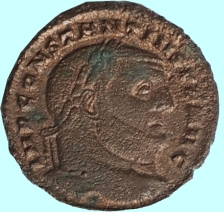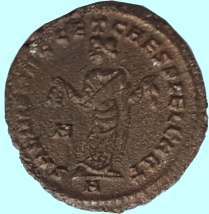|
Roma, 20.4.2021
Di seguito
riporto gli elementi significativi riguardanti la
moneta di figura:
Follis1,
zecca di Cartagine, 1 Maggio 305-25 luglio 306, RIC VI
39a (pag. 428), Cohen
VII 272 (pag. 84), indice di rarità
"C2".
Descrizione
sommaria:
D. IMP CONSTANTIVS P
F AVG2. Costanzo I
Cloro, testa laureata a destra.
R. SALVIS AVGG ET
CAESS FEL KART3.  , segno di zecca4. Cartagine,
stante di fronte, testa a sinistra, sorregge dei
frutti in ciascuna mano. , segno di zecca4. Cartagine,
stante di fronte, testa a sinistra, sorregge dei
frutti in ciascuna mano.
La ricerca nel web di monete della tipologia di figura
ha dato luogo ai seguenti risultati:
- vcoins
Constantius I. Silvered Large Follis. Carthage.
140.00€ Rates for: 04/19/21 Roman Empire -
CONSTANTIUS I (305-306). Silvered Large Follis.
(12.13g. 29mm.) Carthage. IMP CONSTANTIVS P F AVG.
Laureate head right. SALVIS AVGG ET CAESS FEL KART
/ A. Carthago standing facing, head left, holding
fruits in both hands; H to left. RIC 39a.
- ebay
US $150.00 CONSTANTIUS I (305-306). Follis.
Carthage. Obv: IMP CONSTANTIVS P F AVG. Laureate
head right. Rev: SALVIS AVGG ET CAESS FEL KART /
A. Carthago standing facing, head left, holding
fruits in both hands; H to left. RIC 39a.
276-Sab55-34. Ruler Constantius I Chlorus Follis.
Reverse Legend SALVIS AVGG ET CAESS FEL KART.
Grade Good very fine (MBC). Mint Carthage. Weigth
and Diameter 9.60g. 28mm. Metal Æ Bronze.
- https://www.forumancientcoins.com/historia/coins/r6/r21421.htm
Constantius I as Augustus Caesar 293-305 AD:
Augustus 305-306 AD. Billon Follis (Silvered).
Carthage 305-6 AD. Laureate head right "IMP.
CONSTANTIVS P.F. AVG." Carthage standing facing,
head left, in long robe holding fruits in both
hands. "SALVIS AVGG. ET CAESS. FEL. KART.H A. RIC
VI 39a, RCVM 14190. 9.7g. 7.0 - 8.5gs. 27.7mm. [1]
= "IMPERATOR CONSTANTIUS PIVS FELIX AVGVSTVS". [2]
= "SALIS AVGVSTI ET CAESARIS FELIX KARTHAGO" =
Carthage is made happy in the wellbeing of the
Emperors and Caesars. "H" in left field refers to
"Herculi" (i.e. Constantius and Severus) as
opposed to "I" for "Jovi" (Galerius and
Maximinus).
- https://www.romancoinshop.com/en/constantius-i-follis-from-carthage-(n2068)/
Constantius I - follis from Carthage (N2068)
Constantius I - follis from Carthage (N2068).
Product Code: SALVIS AVGG Carthago. Availability:
Sold. 79.00€. Description: CONSTANTIUS I
(305-306). Follis. Carthage. Obv: IMP CONSTANTIVS
P F AVG. Laureate head right. Rev: SALVIS AVGG ET
CAESS FEL KART / A. Carthago standing facing, head
left, holding fruits in both hands; H to left. RIC
39a. Condition: Good very fine. Weight: 8,66g.
Diameter: 29mm.
- https://www.acsearch.info/search.html?id=4302878
Numismatik Naumann (formerly Gitbud & Naumann)
http://www.numismatik-naumann.at/ Auction 56 669
06.08.2017 Description: Roman Imperial Coins.
CONSTANTIUS I (305-306). Follis. Carthage. Obv:
IMP CONSTANTIVS P F AVG. Laureate head right. Rev:
SALVIS AVGG ET CAESS FEL KART / A. Carthago
standing facing, head left, holding fruits in both
hands; H to left. RIC 39a. Condition: Good very
fine. Weight: 9.00g. Diameter: 27mm.
-
coins.ha.com LOT #64255 SOLD ON MAR 25, 2021
Description: Constantius I, as Augustus (AD
305-306). BI follis or nummus (28mm, 10.57g, 12h).
NGC MS 5/5 - 4/5, Silvering. Carthage, 1 May AD
305- 25 July AD 306. IMP CONSTANTIVS P F AVG,
laureate head of Constantius I right / SALVIS AVGG
ET CAESS FEL KART, Carthago standing facing, head
left, with fruits in both hands; H in left field;
A in exergue. RIC VI 39a.
- https://www.acsearch.info/search.html?id=65359
CGB.fr http://www.cgbfr.com/ Description:
CONSTANCE Ier CHLORE (1/03/293-25/07/306) Flavius
Valerius Constantius Auguste (1/05/305-25/07/306).
Follis ou nummus 305-306 N° brm_202349. Date:
305-306. Nom de l'atelier: Carthage Métal: cuivre
Diamètre: 27,5mm Axe des coins: 12h. Poids: 9,64g.
Degré de rareté: R1. Etat de conservation:
TB+/TTB. Commentaires sur l'état de conservation:
Exemplaire bien centré sur un flan large et ovale.
Droit granuleux. Joli revers. Patine marron foncé.
Prix: 75,00€ N° dans les ouvrages de référence:
C.272 - RIC.39 a. Titulature avers: IMP
CONSTANTIVS P F AVG. Description avers: Tête
laurée de Constance Ier auguste à droite (O*).
Traduction avers: 'Imperator Constantius Pius
Felix Augustus', (L’empereur césar Constance pieux
et heureux auguste). Titulature revers: SALVIS
AVGG ET CAESS FEL KART/ H|-// A.
Description revers: Carthage drapée, debout de
face, la tête tournée à gauche, tenant des fruits
dans chaque main. Traduction revers: 'Saluis
Augustoribus et Caesaribus Felicitas Karthago',
(La bienheureuse Carthage pour le salut des césars
et des augustes). Commentaire à propos de cet
exemplaire: C’est le première follis de Constance
Chlore que nous proposons à la vente pour
l’atelier de Carthage!. Historique: Constance est
devenu césar le 1er mars 293 en même temps que
Galère. Constance, devenu auguste en 305, passa en
Bretagne pour combattre les Pictes. Il mourut à
York comme Septime Sévère, le 25 juillet 306.
Constantin avait eu le temps de le rejoindre,
malgré l'interdiction de Galère. Constantin fit
frapper un important monnayage de consécration
puis de restitution en sa mémoire.
- https://auktionen.gmcoinart.de/Auktion/KatalogArchiv
Lotto 2592. Costanzo I. Cloro, 305-306 d.C. AE
Follis (10,40g). 305-306 d.C., Mzst. Cartagine.
Obv.: IMP CONSTANTIVS PF AVG, testa con corona
d'alloro n ° Rev .: SALVIS AVGG ET CAESS FEL KART
/ A, Carthago con frutti in entrambe le mani sta
frontalmente, testa girata a sinistra, l. nella
casella H. RIC VI, 39a. Condizione: patina
marrone-nero, vz. Stim. Prezzo 100€.
- ebay
*Lucernae* Constantius I Follis SALVIS AVGG ET
CAESS FEL KART/H-A Carthage 305 Sold for: US
$75.00 Roman Empire - Constantius (as Augustus)
305-306, bronze large follis. Carthage mint, 305/6
A.D,. IMP CONSTANTIVS PF AVG. Laureated bust to
right. / SALVIS AVGG ET CAESS FEL KART. Carthago
standing, facing, head left holding fruit in both
hands. H to left A in exergue. RIC VI 39a. 8,67g.
28mm.
- https://www.cgbfr.com/constance-ier-chlore-follis-ou-nummus-sup,brm_350913,a.html
brm_350913 - CONSTANTIUS I Follis ou nummus
CONSTANTIUS I Follis ou nummus AU. Item sold on
our e-shop (2015) Price: 150.00€. Type: Follis ou
nummus. Date: 305-306. Mint name / Town: Carthage.
Metal: copper. Diameter: 27mm. Orientation dies:
6h. Weight: 9,02g. Rarity: R1. Officine: 1re.
COMENTS ON THE CONDITION: Exemplaire sur un flan
large et ovale, bien centré des deux côtés. Très
belle tête de Constance Ier. Joli revers de style
fin. Belle patine marron foncé. CATALOGUE
REFERENCES: C.272 - RIC.39a. OBVERSE Obverse
legend: IMP CONSTANTIVS P F AVG. Obverse
description: Tête laurée de Constance Ier auguste
à droite (O*). Obverse translation: "Imperator
Constantius Pius Felix Augustus", (L’empereur
césar Constance pieux et heureux auguste). REVERSE
Reverse legend: SALVIS AVGG ET CAESS FEL KART/
H|-// A. Reverse description: Carthage drapée,
debout de face, la tête tournée à gauche, tenant
des fruits dans chaque main. Reverse translation:
"Saluis Augustoribus et Caesaribus Felicitas
Karthago", (La bienheureuse Carthage pour le salut
des césars et des augustes). COMMENTARY Rubans de
type 2 aux extrémités bouletées. HISTORICAL
BACKGROUND CONSTANCE I CHLORINE
(1/03/293-25/07/306) Flavius Valerius Constantius
August (1/05/305-25/07/306). Constance became
Caesar on 1 March 293 along Galley. Constance
became august 305, passed in Britain to fight the
Picts. He died at York as Septimius Severus, July
25 306. Constantine had the time to join, despite
the prohibition of Galerius. Constantine had hit a
major counterfeiting consecration then return to
his memory.
Concludo osservando che le caratteristiche fisiche,
generali e di stile della moneta di figura sono
comparabili con quelle dei conî d'epoca. Nel presente
stato di conservazione la moneta, se autentica, vale,
a mio avviso, una trentina di euro.
Un saluto cordiale.
Giulio De Florio
-------------------------------
Note:
(1) Follis. Il
follis del periodo pesava, secondo il Ric, 8,5÷10g e
aveva un asse di conio ad ore 12 o ad ore 6.
Raccolgo in tabella le caratteristiche fisiche delle
monete della tipologia di figura tratte dai link sopra citati:
| Riferimenti |
Peso(g) |
Asse di conio (ore) |
Diametro(mm) |
|
link1 |
12,13 |
- |
29 |
|
link2 |
9,60 |
- |
28 |
|
link3 |
9,7 |
- |
27,7 |
|
link4 |
8,66 |
- |
29 |
|
link5 |
9,00 |
- |
27 |
link6
|
10,57 |
12 |
28 |
link7
|
9,64 |
12 |
27,5 |
|
link8 |
10,40 |
- |
- |
| link9 |
8,67 |
- |
28 |
|
link10 |
9,02 |
6 |
27 |
Dall'esame della tabella emerge che il follis in
esame ha caratteristiche fisiche (10g, 25mm)
comparabili con quelle delle monete autentiche del
periodo.
(2) IMP CONSTANTIVS P F AVG
(IMPerator CONSTANTIVS Pius Felix AVGustus). Il 1
maggio del 305, Diocleziano, giunto al ventesimo
anno di potere, si ritirò dalla vita pubblica, come
precedentemente aveva stabilito e altrettanto
pretese da Massimiano Erculio, suo co-Augusto. Con
l'uscita di scena, i due Augusti assunsero il titolo
puramente onorifico di "Seniores Augusti,
felicissimi et beatissimi". Galerio Massimiano
Cesare e Costanzo Cesare furono promossi al rango di
Augusti, rispettivamente d'Oriente e d'Occidente. Ma
a guadagnarci fu sopra tutto Galerio. Infatti, anche
se Costanzo, come Augusto senior, possedeva il
supremo potere legislativo, come era stato quello di
Diocleziano prima di lui, fu Galerio a scegliere,
tra uomini certamente a lui fedeli, i due nuovi
Cesari nelle persone di Flavio Valerio Severo
(Cesare d'Occidente) e Valerio Massimino Daia, suo
nipote (Cesare d'Oriente).
(3) SALVIS AVGG ET CAESS FEL KART
(SALVIS AVGustis ET CAESaribus FELix KARTago - Beata
Cartagine, essendo gli Augusti e i Cesari in buona
salute). Monete con la stessa tipologia del rovescio
furono battute nel nome di ciascuno dei tetrarchi:
- IMP
CONSTANTIVS P F AVG, Costanzo I
Cloro Augusto, Ric 39a, la moneta di figura;
- IMP MAXIMIANVS
P F AVG, Galerio Massimiano
Augusto, Ric
39b,
- FL VAL SEVERVS
NOB CAES, Severo Cesare,
Ric 40a,
- GAL VAL
MAXIMINVS NOB CAES, Massimino
Daia Cesare,
Ric 40b.
(4)  è il segno
di zecca. In esergo la lettera A, corrispondente al
numero greco 1, indica l'officina monetale che ha
battuto la moneta (la prima di quattro attive nella
zecca), H è il segno
distintivo dell'emissione. è il segno
di zecca. In esergo la lettera A, corrispondente al
numero greco 1, indica l'officina monetale che ha
battuto la moneta (la prima di quattro attive nella
zecca), H è il segno
distintivo dell'emissione.
|

